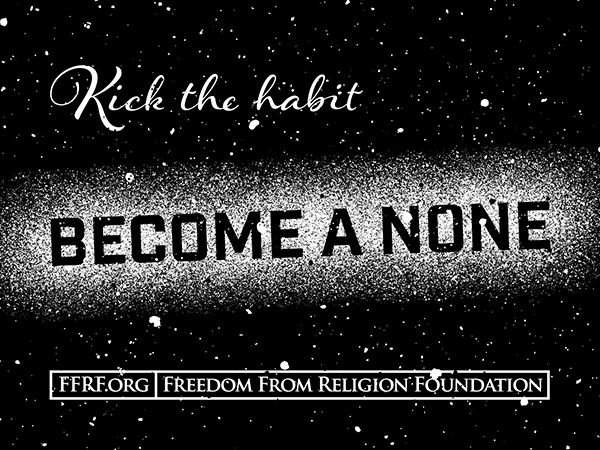
The Freedom From Religion Foundation is celebrating findings released today that show a shrinking white Christian majority and a stable percentage of religiously unaffiliated Americans.
The Public Religion Research Institute’s “2020 Census of American Religion” documents that white Christians, previously a supermajority, have declined by nearly a third in the last few decades, from 65 percent in 1996 to a low of 43 percent in 2017. Today, white Christians comprise 44 percent of the population.
The number of “Nones,” those with no religious affiliation, has tripled since the 1990s, to comprise 23 percent of the U.S. population in 2020. “The increase in proportion of religiously unaffiliated Americans has occurred across all age groups but has been most pronounced among young Americans,” the report states.
The “Nones” have made substantial inroads in all sectors. One in five Black Americans and one in five Hispanic Americans today is religiously unaffiliated. More than a third of multiracial Americans are religiously unaffiliated, as are 28 percent of Native Americans. Asian-Americans and Pacific Islander Americans are overall the most likely to be religiously unaffiliated, at 34 percent.
Nearly four in ten (39 percent) religiously unaffiliated Americans live in urban areas, 44 percent live in suburban areas, and 17 percent live in rural areas. Religiously unaffiliated Americans are primarily independents and Democrats. The median age of religiously unaffiliated American adults is 38, much younger than the median age of all Americans.
A majority of white Americans still identify as Christian, breaking down as 50 percent Protestant, 23 percent evangelical, 27 percent mainline Protestant and 19 percent Catholic. Jews are at 2 percent and Muslim, Buddhist, Hindu or other religions make up less than 1 percent of the white U.S. population. White Christians tilt Republican: 39 percent identify as Republican, 31 percent identify as Democrat, and 28 percent identify as independent, says the report.
Seventy-two percent of Black Americans, three-quarters of Hispanic Americans, 34 percent of Asian American and Pacific Islander Americans and 60 percent of Native Americans identify as Christian.
Nearly one in four Democrats is religiously unaffiliated, compared to 13 percent of Republicans. However, the Public Religion Research Institute notes, the shares of religiously unaffiliated have increased in both parties. The institute’s study shows that two-thirds of Republicans identify as white and Christian, compared to 39 percent of Democrats.
Notably, the study shows that white evangelical Protestants make up only 14 percent of the U.S. population as of 2020.
“This groundbreaking study shows how important it is that we ‘Nones’ must flex our collective muscle, through our ballots and our lobbying presence, to ensure that our government and courts know we are here,” says FFRF Co-President Annie Laurie Gaylor. “White Protestant evangelicals represent only 14 percent of the population, yet their views, which are often Christian nationalist, are so disproportionately represented in Congress, statehouses and on court benches.”
The census is based on interviews with more than 500,000 respondents between 2013 and 2020. It provides the most detailed estimates of American religious affiliation since the U.S. Census Bureau last collected religious data in 1957.

